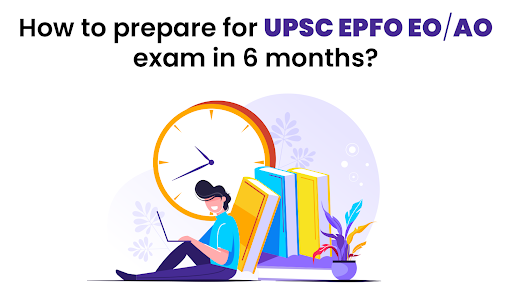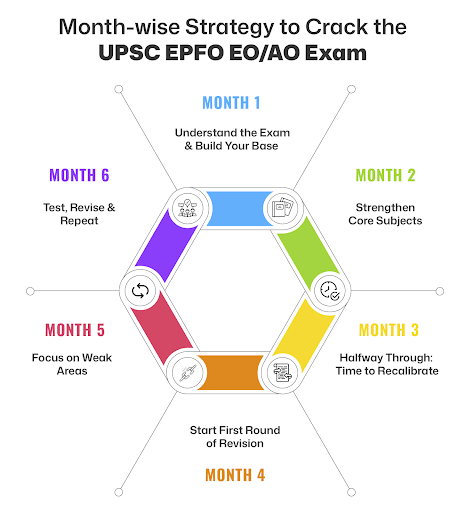If you’re wondering how to crack this exam in just half a year, the smartest way to begin is by diving into the UPSC EPFO previous year paper. This single source helps you understand what UPSC actually asks, how topics are distributed, and which areas require more attention. Instead of blindly covering everything under the sun, these papers show you where to direct your energy. For a time-bound plan like six months, studying smart matters more than studying hard, and these papers give you that edge.
Once you’ve analyzed the trend, you’ll notice that the exam tests both your factual knowledge and your conceptual clarity. It covers a wide range of topics including Indian polity, history, economy, labour laws, and even quantitative aptitude. But it is manageable if you plan it out smartly. What matters most is consistency and the discipline to show up daily.
That brings us to the core of your mission i.e. preparing for the UPSC EPFO EO/AO exam strategically, not randomly. With only six months in hand, it’s crucial to break down the syllabus, prioritize high-weightage areas, and use reliable resources. This guide will walk you through a month-wise plan, best books, mock strategy, and time-saving tips to help you clear the exam confidently.
Let’s dive in and look at a 6 month detailed preparation plan:
Month-wise Strategy to Crack the UPSC EPFO EO/AO Exam
Month 1: Understand the Exam & Build Your Base
Understand the bigger picture, what is this exam truly testing?
Don’t aim to “cover everything” rather aim to understand the pattern of what gets asked. Keep the following points in mind:
- Go through the official syllabus and analyze 3–5 previous year papers in depth.
- Break down the syllabus into manageable blocks based on what has been repeatedly asked.
- Identify your strong and weak areas and categorize topics accordingly.
- Start building your foundation by reading basic books like:
- Indian Polity by M. Laxmikanth
- Indian Economy by Ramesh Singh or NCERTs
- A Brief History of Modern India (Spectrum)
As these three form the backbone of your preparation.
- Begin daily current affairs (preferably a trusted monthly compilation).
- Make short, one-page notes for every chapter, and focus on what UPSC asks, not what it could ask.
- Target: 4–5 hours of dedicated study daily. By the end of Month 1, you should know the pattern inside out and finish at least 30% of Polity and History.
Month 2: Strengthen Core Subjects
This is where you pick up pace. Continue with Polity and Economy, but now introduce Labour Laws, Industrial Relations, and Social Security. Most candidates ignore these till the end, don’t make that mistake.
Keep these points in mind:
- Complete remaining Polity and History.
- Start to focus on Labour Laws, Industrial Relations, and Social Security.
- Use simple PDFs or YouTube explainer videos for conceptual clarity.
- Add General Science basics, especially from NCERTs (6–10).
- Dedicate 1 hour daily for quantitative aptitude and reasoning- even 30 minutes a day can make a huge difference by the end of 6 months.
- Start Current Affairs (past 6 months first) from reliable monthly compilations.
- Make short notes for revision.
- Attempt 1 subject-wise mini test every 3 days to assess retention.
- Target- End month 2 with 60% syllabus done and one full revision of Polity.
Month 3: Halfway Through- Time to Recalibrate
Now’s the time to pause and check: Where are you lagging? Which areas are eating up your time but yielding low accuracy?
- Bring in mock tests now – at least one full-length test every week. More importantly, spend twice the time analyzing your mistakes.
- Practice static GK and revise topics like General Science and Current Affairs.
- Cover untouched areas:
- Labour Laws, Social Security & Industrial Relations
- Current Affairs with a special focus on schemes and reports
- General accounting principles
- Revise Polity + History from short notes
- Finish Economy and Labour laws
- General Science: Focus on Biology, Environment (from Lucent or NCERT 6–8)
- Static GK: National parks, awards, books, constitutional bodies, etc.
- Quant + Reasoning: Start time and work, simple/compound interest, puzzles
- Practice questions after every topic.
- Attempt full-length mock tests on weekends.
- Target- By now, you should have done one full revision of Polity and history, completed economy and history syllabus and attempted a few full mocks. By month end, 70–80% of your syllabus should be touched, if not fully mastered.
Month 4: Start First Round of Revision
Now the focus shifts from coverage to retention. Start revising your notes. Your goal now is simple: for every subject, you should be able to recall the key points in under 15 minutes.
- Revise everything studied so far using your notes.
- Make concise revision flashcards.
- Focus on previous year papers and mock tests.
- Analyze your mistakes, not just your scores.
Keep these points in mind:
- Begin your first full revision cycle.
- Practice 5–10 MCQs per topic daily.
- Revise Labour Laws and Current Affairs thoroughly.
- Attempt mocks frequently and review it honestly.
- Revisit PYQs to notice recurring patterns.
- Current Affairs: Past 6 months compiled
- Static GK Revision: Memorize through MCQs
- Science + Quant Focus: Revisit tricky concepts, practice 20 MCQs/day
- Target- This is a performance month. Identify mistakes, adapt, and tighten your preparation loop. Revise 50-60 % of the content, attempt mock tests while focussing on time improvement, and update notes for fast revision.
Month 5: Focus on Weak Areas
Not the time to chase new resources. This is the month to fine-tune your strategy. Analyze mock tests and identify areas where you are scoring low and focus entirely on those. Focus on strengthening your weak areas.
Take care of these points:
- Practice at least two mocks a week now, under exam conditions.
- Revisit topics where your mock scores are low.
- Practice from the UPSC EPFO previous year papers.
- Time-bound practice for Quant, Reasoning, and General English.
- Make short notes for fast and efficient revision
- Target- Focus on weak areas, mock tests and improving retention.
Month 6: Time to Test, Revise & Repeat
In the final month, it’s all about being calm, having clarity, and working with confidence. Revise what you have already read, and do not pick up new material at this time. Only revision, mocks, and focused MCQ practice.
Keep these points in mind:
- Focus entirely on revision and mock test performance.
- Take at least 2 mocks in a week and analyse them.
- Take care of your health– stay calm, eat healthy, and avoid burnout.
- Revise static subjects from your notes.
- Static + Labour Law Notes: Revise 3–4 times in this month.
- Read 3-month current affairs deeply.
- Practice breathing for mental focus – you need a calm, sharp mind on exam day.
- In this final month, consistency is more important than intensity. Keep your revision light but consistent.
Additional Tips to Maximize Results
- Use only limited sources – revise them multiple times.
- Time-block your day with clear hours for theory, MCQs, and revision.
- Use spaced revision (revise same topic after 3, 7, and 15 days).
- Join a test series in month 3 to simulate exam pressure.
- Don’t burn out – take 30-min breaks and 1 “no study” half-day each week.
- Stay consistent – 6 months isn’t short if you use each day wisely.
Clearing the UPSC EPFO EO/AO exam in 6 months can sound a little difficult, but the right strategy and focussed preparation with consistency can make it happen.





